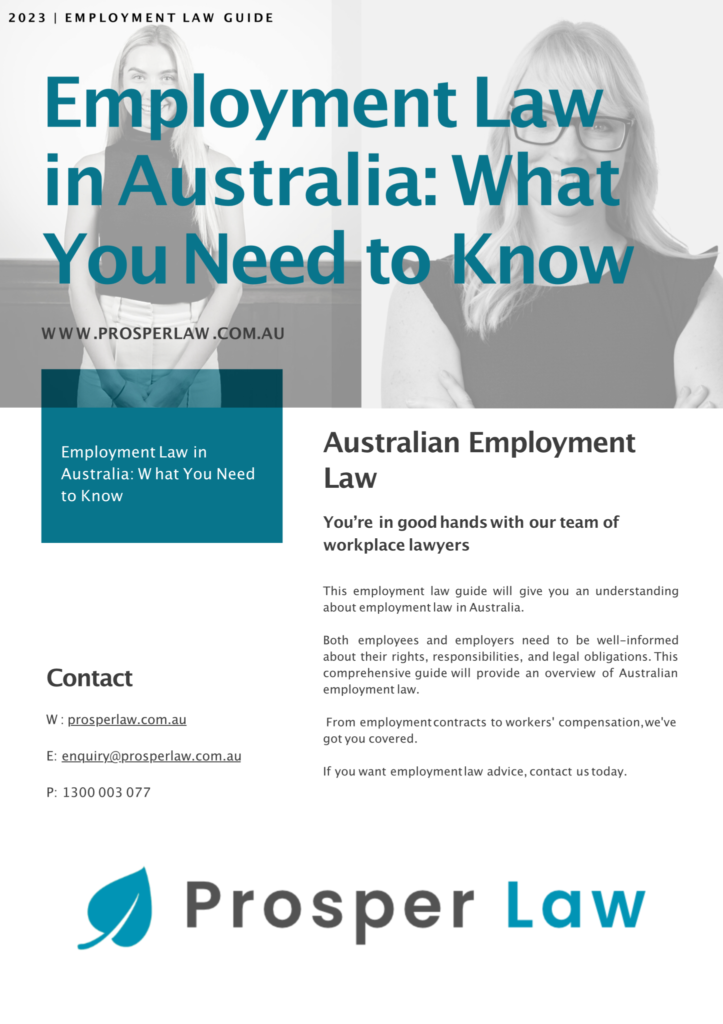Certain criteria must be met for a high income earner to have access to unfair dismissal. Those criteria include that the high income earner has met the minimum employment period. Further, the person must be covered by a Modern Award or an Enterprise Agreement.
There are some technical legal points to consider when it comes to unfair dismissal and high income earners. In this article, our employment law lawyer explains what they are and how they apply.
Who is a high income earner when it comes to unfair dismissal?
When it comes to how much money an employee earns, there are two relevant avenues for unfair dismissal.
One avenue for unfair dismissal is if the employee earns below the high income threshold.
Alternatively, if the employee earns more than the high income threshold, the employee may still have access to an unfair dismissal remedy if the employee is covered by an Award or if an Enterprise Agreement applies to the person.
The relevant section of the Fair Work Act 2009 is s382, which states:
When a person is protected from unfair dismissal
A person is protected from unfair dismissal at a time if, at that time:
- (a) the person is an employee who has completed a period of employment with his or her employer of at least the minimum employment period; and
- (b) one or more of the following apply:
- (i) a modern award covers the person;
(ii) an enterprise agreement applies to the person in relation to the employment;
(iii) the sum of the person’s annual rate of earnings, and such other amounts (if any) worked out in relation to the person in accordance with the regulations, is less than the high income threshold.
Only one of (b)(i), (ii) or (iii) needs to apply for a worker to have access to an unfair dismissal remedy.
The high income threshold
The high income threshold changes every year. Since 1 July 2022, the high income threshold is $162,000.
If a person earns below this threshold, they have access to unfair dismissal and forced resignation dismissal. And that will be regardless of whether a Modern Award or Enterprise Agreement applies.
High income employees
If a person earns more than the high income threshold, they may not have access to unfair dismissal. That is, unless they:
- are ‘covered’ by a Modern Award; or
- an Enterprise Agreement applies to them; and in either case
- the person’s income is guaranteed for at least 12 months and during the period in which dismissal occurred (if the worker meets this final criterion, they will fit the definition of a ‘high income employee’
In s 329 of the Fair Work Act 2009, a high income employee is defined as:
If the employee is full-time
(1) A full-time employee is a high income employee of an employer at a time if:
(a) the employee has a guarantee of annual earnings for the guaranteed period; and
(b) the time occurs during the period; and
(c) the annual rate of the guarantee of annual earnings exceeds the high income threshold at that time.
If the employee is part-time
(2) An employee other than a full-time employee is a high-income employee of an employer at a time if:
(a) the employee has a guarantee of annual earnings for the guaranteed period; and
(b) the time occurs during the period; and
(c) the annual rate of the guarantee of annual earnings would have exceeded the high income threshold at that time if the employee were employed on a full-time basis at the same rate of earnings.
Timing is important when it comes to unfair dismissal
An application for unfair dismissal must be filed within 21 days of the date the dismissal took effect. The 21-day time period starts the day following the date the dismissal took effect.

For example, if Joe Bloggs is told by his employer on 6 January 2023 that his employment is terminated, with effect from 10 January 2023, the 21-day time period starts on 11 January 2023.
Aside from the 21-day time limit for bringing applications, timing is important for another reason. At certain times during a worker’s employment, they may be placed in different roles, with different duties and responsibilities. Timing becomes particularly relevant in these circumstances because a Modern Award or Enterprise Agreement may apply at one period of employment, but not at other times.
What’s important in the context of high income earners is that:
- a Modern Award covers; or
- an Enterprise Agreement applies,
at the time the worker’s dismissal took effect.
This might mean that a person has access to unfair dismissal at certain points during their employment, and not at others.
Modern Awards and Enterprise Agreements
The significance of a Modern Award applying to a worker is that the worker does not get the benefit of rights set out in the Award. And further, the obligations in the Award don’t apply to the employer. This is set out in section 46 of the Fair Work Act 2009 (Cth):
Section 46 of the Fair Work Act 2009 – The significance of a modern award applying to a person
(1) A modern award does not impose obligations on a person, and a person does not contravene a term of a modern award, unless the award applies to the person.
(2) A modern award does not give a person an entitlement unless the award applies to the person.
However, for the purposes of unfair dismissal, s382 of the Fair Work Act does not require an Award to apply to a person. All that is required is that an Award ‘covers’ the person.
When do they ‘apply’ to an employee?
A Modern Award applies to a worker when they are covered by the Award’s terms and conditions and are performing the kinds of work described in the Award. This means that an employee must be performing work that is included in the definition of the classification specified in the Award.

Further, the worker’s employer must be covered by the Award in order for the Award to apply to the employee.
Section 47 of the Fair Work Act 2009 – When a modern award applies to an employer, employee, organisation or outworker entity
(1) A modern award applies to an employee, employer, organisation or outworker entity if:
(a) the modern award covers the employee, employer, organisation or outworker entity; and
(b) the modern award is in operation; and
(c) no other provision of this Act provides, or has the effect, that the modern award does not apply to the employee, employer, organisation or outworker entity.
An Award will not apply to an employee who is covered by an enterprise agreement or a workplace determination.
However, remember that s 382 of the Fair Work Act 2009 does not require an Award to apply to a high income earner for them to have access to unfair dismissal remedies. It only requires a high income earner to be covered by an Award.
When do they ‘cover’ an employee?
Section 48 of the Fair Work Act 2009 (Cth) describes when an Award will cover a worker.
A Modern Award will ‘cover’ an employee if the Award is expressed to cover the employee. This means that the employee is captured by the ‘coverage’ clause in the Award at the time they are unfairly dismissed.
When will a Modern Award cover a high income employee?
In summary, a Modern Award will cover a high income earner and give them access to protection against unfair dismissal when:
- the employee’s annual earnings are guaranteed over at least a 12 month period
- the employee is covered by an Award (for instance, because they meet the coverage clause and are performing work that meets a classification description in the Award)
- the Award is still in operation
How can Prosper Law help?
Prosper Law is a fixed-fee law firm. We provide employment legal advice for an upfront, fixed price. We help both employers and employees.
If you need an employment law lawyer that will work with you to identify and solve your workplace problems, contact us today for a no-obligation quote.


